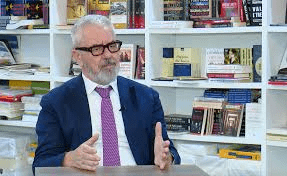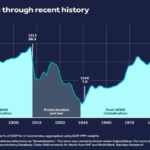Albert Rakipi
In 1919, Vatra, a pan-Albanian association functioning as something of a shadow Albanian government in the United States, made an unprecedented request to Secretary of State Robert Lansing: Albania should become an American protectorate. Just three months later, at the Paris Peace Conference, President Woodrow Wilson rejected the Secret Treaty of London, which would have effectively erased Albania from the map as an independent state. Thereafter, in the autumn of 1946, Albania issued an ultimatum to the US to withdraw its diplomatic mission, forcing its members to flee under the protection of American warships. For the next 50 years, the US was branded Albania’s greatest and most dangerous enemy by the communist regime. Yet, through it all, two generations of Albanians held onto the hope that one day ‘the Americans would come to liberate the country from communism’. In 1991, Albania and the United States re-established diplomatic ties and today Albania is perhaps the most pro-American country in the world, as well as being the only aspiring EU member with near-unanimous support for membership.
Throughout modern Albanian history, relations with the US have either been exclusive and privileged or non-existent. To understand and explain contemporary Albanian-American relations, it is essential to deconstruct myths and explain paradoxes as a necessity for encouraging democratisation of the asymmetric relations between a great power and a small state so as to protect and develop these relations in the years ahead.
‘Myths are lies that tell the truth’
On June 5, 2007, President George W. Bush was greeted in Prague by two thousand protesters opposing US plans to install a missile defence system in Europe. Five days later, tens of thousands gathered to welcome him in Tirana’s main square, decorated as if for a grand celebration with portraits, Albanian and American flags together with slogans for the occasion. For the older generation, this might have evoked memories of similar receptions during communist times when Soviet leader Nikita Khrushchev or Chinese Premier Zhou Enlai visited Albania in 1959 and 1965 respectively. This resemblance, along with Albania’s history of asymmetric relationships with great powers, leads some scholars to categorise Albania-US relations as ‘client-patron’. As with many small states, over the past one hundred years Albania has sought various alliances, first with the Soviet Union, then China and finally the United States.
However, careful observation of Albania’s foreign relations does not necessarily support this pattern, with Albanians’ love for the US at first glance seeming irrational. Looking back over one hundred years of relations, this love has certainly been grounded in rationality – even as it was becoming a myth. As the ancient thinker Aphthonius noted, “Myths are lies that tell the truth”. However, where does the rationality lie in Albanians’ love for America and what are some of the truths behind the myth? Regardless of their asymmetry, Albania’s ties with the US have always revolved around crucial issues vital to the Albanian state and nation. For instance, in 1919 President Wilson became a national hero for Albanians when he intervened to save the country from partition. Relations with the US, in Albania’s case, have defined its relations with the West. After the Second World War, Albania’s society was split: pro-Western Albanians, which were in the majority, looked to the US for economic and cultural guidance, while pro-Eastern factions turned to the Soviet Union. It is important to note that at this time, when the country had less than one million inhabitants, more than a quarter of a million Albanians had either emigrated to the US or had family there.
As mentioned earlier, in modern Albanian history, relations with the US have been either exclusive and privileged or non-existent. When they have existed, they have been deeply rooted in principles of freedom and democracy. Hence, in 1945 the US refused to recognise rigged elections and the communist regime of Enver Hoxha, with the result that less than twelve months later Albania’s new communist government forced the US to withdraw its diplomatic mission. In 1991, restoration of relations hinged on America’s demand for the existence of a democratic opposition in Albania. Hence, from 1992 Albania embraced democratic reforms and strengthened ties with the West. In 2008, Washington championed Albania’s NATO membership, the greatest achievement of modern Albania since the fall of communism, thereby firmly linking Albania’s present and future with the West and as such becoming the United States’ most reliable Balkan ally.
As a sign of its gratitude, all Albania’s governments over the past thirty years have supported US foreign policy and moreover have become actively involved, for example in Afghanistan and by joining the coalition against ISIS led by the US. During the 1999 Kosovo crisis, America spearheaded NATO’s intervention and supported Kosovo’s subsequent independence in 2008. Albania’s strategic partnership with the US was formalised in 2013, when Tirana and Washington signed a strategic partnership agreement. In popular sentiment too, the US is perceived by Albanians as their country’s most important strategic ally, a relationship more valued than that with the European powers, including the European Union, with which Tirana claims strategic relations.
According to annual surveys conducted by the Albanian Institute of International Studies, both the US and the EU enjoy strong public support in Albania, with approval ratings of 90 % and 91 %, respectively. They are regarded as the most important strategic partners in Albania’s international relations.
“It’s (not) the economy, stupid!”
For decades, Albanians believed that the US would one day liberate them from communism. This hope endured for 50 years, until it finally happened in 1991, when Secretary of State James Baker was welcomed in Tirana with much popular fanfare. Since then, Albania has built a solid relationship with the US, a relationship which is contributing to Albania’s democratic transformation. Yet, one key area remains underdeveloped: the economy.
Despite various economic agreements, trade between the two countries remains minimal, and US investments in Albania continue to be small. The reasons can be attributed to Albania’s unattractive investment environment, weak rule of law and high corruption levels. Moreover, Albania’s small market size makes it of peripheral interest for American companies and other FDI. Western countries dominate in foreign investments in Albania. These include Italy, Switzerland, Canada, the Netherlands, Greece and Austria, with Hungary also emerging as a player in the last three years. Within this group, the majority of investments come from EU member states in strategic sectors like banking, energy and construction, with Switzerland accounting for 16% and Canada 12%. Turkey is another significant foreign investor, contributing 7.6%. Regarding trade, China currently holds the third position after the EU and Turkey, although Chinese investments have been inconsistent.
Moreover, other Balkan states have much stronger economic ties to the US than Albania. In 2023, US investments amounted to a modest figure of 32 million euros, just four million more than investments from Kosovo. Countries like the Netherlands, Switzerland, Austria, Canada, Turkey and Greece all have a larger presence. Over the past 20 years, US investments in Albania amounted to 232 million dollars, while US investments in Serbia were 4 billion dollars for the same period. On the other hand, trade and economic investments from the EU are vastly larger, confirming that the EU is the strategic ally for Albania when it comes to the economy. The volume of trade for 2022 alone between Albania and the EU was 7.1 billion euros, while investments reached 382 million euros. Since 2020, through the European Investment Plan, the EU has already mobilized 1.4 billion euros in investments, of which 470 million are grants.
Back to the future
More than 30 years after re-establishing ties, Albania-US relations are in transition. What does the future hold at a time when foreign policy is becoming increasingly transactional, raising concerns that a strategic partnership can become a ‘client-patron’ relationship. A century ago, Albanian leaders lobbied in Washington for the independence and existence of Albania as an independent sovereign state. In April 1939, just 48 hours before fascist Italy invaded Albania, King Zog tearfully summoned the American ambassador for an urgent and special audience, asking for help, saying that “only the US can save Albania and its independence”. Against this historical legacy and in sharp contrast to how foreign democratic powers such as Germany or Norway gain influence in Washington, contemporary Albanian leaders, caught in an extreme zero-sum game for power, try to buy support in Washington to gain advantages over their political opponents at home.
How will this strategic partnership develop? Will Albania continue to say ‘yes’ to every US request, as it did when it sheltered MEK, a former terrorist group, and Afghan refugees fleeing the Taliban regime? Will Albania continue to favour the US over Western Europe, as it did in 2003 when it chose an alliance with ‘New Europe’ against ‘Old Europe’? Moreover, how will this affect Albania’s EU ambitions, when the US itself supports Albania’s future in the EU? This readiness to agree to every request risks transformation into a client-patron relationship, thereby making it harder to maintain a strategic partnership.
Besides being the ‘guardian angel’ of Albania’s independence and statehood, the US has known since the rigged 1945 elections that only a democratic Albania can be a partner to the US and the West. Moreover, only a democratic Albania can join the EU. Sliding into autocracy and the failure to build a democratic and functional state undermines the strategic partnership. Albania’s economic relations with the US shone brightly 75 years ago, but today must be regarded as poor. The reasons can be found in Albania’s market economy not functioning properly as the rule of law is not being strictly enforced.
Finally, with a culture of total dependency, Albania behaves as if it were a protectorate or as if it has just emerged from a colonial regime. Every group or individual with a grievance – students, unions, prisoners, LGBT groups, minorities, journalists, women’s organisations, veterans, political parties and their leaders, the mayor, the chief justice, the opposition leader – even the head of parliament and the president – pen letters of complaint or clarification to the international community. This starts with the US ambassador, who is at the centre of media attention as if he or she were the country’s viceroy.
A potential turning point in US-Albanian relations might emerge with the new US administration. It is difficult to believe that President Trump would give significant attention to the Western Balkans, given the more pressing preoccupation with Russian aggression against Ukraine and a worsening crisis in the Middle East. However, geopolitically, the Balkans are significant in light of Russia’s proxy policies in its confrontation with the US and the West. As such, it is not impossible for the Trump administration to mediate a resolution to the frozen conflict between Serbia and Kosovo, thereby neutralising the main source of tensions in the region and Russia’s proxy policies. In 2020, Trump personally engaged in an agreement between Serbia and Kosovo, while over the past four years Washington and the EU have encouraged dialogue between Belgrade and Pristina on vehicle licence plates and other peripheral issues, hoping that a bottom-up approach would end the frozen conflict between the two states. It is not impossible that, with a top-down approach typical of Trump’s style, the two states could move toward mutual recognition as two independent states during his second term.
Changes are also expected in terms of intrastate relations. In recent years, we have seen a growing trend toward a more transactional approach in US foreign policy. Washington and the West, in general, have turned a blind eye to the increasingly autocratic regimes in the Western Balkans, including Albania. Although such a trend may strengthen, moving forward, a reflection and a more neutral role for Washington in Albania’s internal politics is needed.
After the Cold War, Albania managed to establish a privileged and exclusive relationship with the United States, mainly due to the unparalleled influence and role it played in an unstable Balkan region. Unfortunately, over the last ten years, this role has gradually diminished. So the future of Albania’s relations with the United States will depend on Albania’s ability to regain the key role it once held in the Balkans, at a time when Serbia has almost restored its relations with the US and the West.
Recommendations
Albania is a key country, alongside Serbia, for the stability and security of the Western Balkans. Surrounded by EU nations, the region directly impacts the European and Euro-Atlantic security environment. Since the end of the Cold War, US intervention was crucial in ending violent conflicts in the Balkans. Now, three decades later, only the continued engagement of the US and the EU can resolve the frozen conflict between Albanians and Serbs through the mutual recognition of Kosovo and Serbia as sovereign states.
Democratic backsliding, authoritarian tendencies and lingering totalitarian culture among Albania’s current political leaders could lead the country toward a one-party system, undermining relations with the US. Given the special relationship Albania shares with the US and the EU, both are in the best position to prevent the rise of a stabilocracy and the drift toward one-party rule.
Short-term transactional approaches and interests may entrench stabilocracies in the Western Balkans and will not foster democratic, responsible and uncorrupted governance. The new generation of Albanian political leaders — the ones who will take over from those who have dominated the political scene for three decades, whether in power or opposition — must move away from the dependency on the international community. They should offer fresh ideas to maintain US and EU support, ending the practice of purchasing influence for personal political gain in Washington or Brussels.
At the diplomatic level, US and EU envoys can assist in strengthening Albanian democracy by not acting as, or being perceived as, being external rulers of the country.
The essay ”From Staunch Enemy to Strategic Partner: Albanian-American Relations in Transition “ by Albert Rakipi is part of the book : “The United States and the Future of Europe,” recently published (May 2025) by Springer.
Albert Rakipi currently serves as Chairman of the Albanian Institute for International Studies (AIIS) a think tank based in Tirana, Albania. He has PhD in International Relations from Bilkent University. Before assuming this position, he had previously served as Deputy Minister of Foreign Affairs of the Republic of Albania. Representative of AIIS to the European Security and Defense College (ESDC) .Albert Rakipi has played a key role in establishing the Tirana Campus of the College of Europe in 2022- 2024 through a special inception proposal and dedicated advocacy Dr. Rakipi is the Founder and Editor of the Albanian Journal of International Relations and Foreign Policy issues “Tirana Observatory”. Co-founder and co-editor of Tirana Times a weekly English Newspaper published in Tirana . His latest books are: “The Perils of Change” Albania’s Foreign Policy in transition”Albanian -Turkey Relations Continuity and Change,’ “Albania and Kosovo, Is Unification the Common Future “






